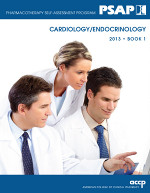
Cardiovascular and endocrine disorders cross all age groups and practice settings, and the clinical pharmacist is likely to encounter patients with one or more of these disorders. The first 2013 release of the Pharmacotherapy Self-Assessment Program (PSAP), Cardiology and Endocrinology, includes important information on recent advances in the pharmacotherapy of these disorders as well as evidence-based practice considerations on the management of several important cardiovascular and endocrine conditions.
Cardiology and Endocrinology, released January 15, has three learning modules with an available 20 continuing pharmacy education (CPE) credits. The first module examines the newer pharmacotherapies used to treat type 2 diabetes mellitus, management of cardiovascular complications in patients with diabetes, and newer drug therapies for osteoporosis and their practice considerations. The second module contains updates on the pharmacotherapy of acute decompensated heart failure, the use and role of newer antiplatelet agents in the management of acute coronary syndrome, and newer anticoagulation strategies for the treatment of atrial fibrillation. The third module discusses the therapeutic management of patients with heart failure with preserved ejection fraction, the role of pharmacogenomics in the management of cardiovascular conditions, and key medication safety issues and their implications in cardiovascular health.
PSAP chapters are now fully referenced, with online links to literature compilers such as PubMed. In addition, hypertext links provide ready access to clinical practice guidelines, official recommendations, and patient assessment tools. New graphic features focus on pivotal studies, patient care scenarios, and take-home points that can be readily integrated into clinical practice.
Cardiology and Endocrinology is designed to assist pharmacists who want to:
-
Compare and contrast the differences between the drug therapy recommendations of several of the latest and leading diabetes guidelines.
-
Assess the differences in incretin-based therapies for the treatment of type 2 diabetes mellitus and explain how they compare with other agents to treat hyperglycemia.
-
Distinguish new physiologic and pathophysiologic pathways of bone health and their influence on the development of new pharmacotherapy targets.
-
Design an appropriate treatment plan for patients with diabetes and risk factors (e.g., hypertension and dyslipidemia) for cardiovascular disease.
-
Apply evidence-based data to design a therapeutic regimen for the management of acute decompensated heart failure with diuretics and/or vasodilators to optimize clinical outcomes.
-
Evaluate and modify drug therapy regimens in the patient with acute decompensated heart failure who is receiving vasoactive and mechanical therapies to optimize hemodynamics, volume status, and anticoagulation.
-
Evaluate the role of the newer antithrombotic agents in the care of the patient with acute coronary syndrome and atrial fibrillation on the basis of current evidence and guideline recommendations.
-
Distinguish between risk stratification tools to determine the risk of ischemic stroke in patients with atrial fibrillation and risk of bleeding in patients exposed to chronic oral anticoagulation and newer treatment schemes.
-
Distinguish the clinical presentation, diagnosis, and treatment strategies of heart failure with preserved ejection fraction from those of heart failure with reduced ejection fraction.
-
Evaluate opportunities for pharmacogenomic testing in patients with cardiovascular diseases, including hypertension, acute coronary syndromes, and heart failure.
-
Discuss the clinical adoption of pharmacogenomic tests in cardiovascular medicine and its impact on the treatment of individual patients.
-
Evaluate and assess current literature on medication safety issues and their implications on patients’ cardiovascular health.
PSAP 2013–2015 books are available singly or as a six-book series and in four format packages. Other books in the series are Special Populations, Critical and Urgent Care, Chronic Illnesses, Infectious Diseases, and CNS/Pharmacy Practice. For specific release dates, available CPE credits, and program numbers for each book, or to place your online order, visit the ACCP Online Bookstore. Books are priced as follows; shipping and handling charges apply to print books only.
PSAP 2013–2015
| SINGLE BOOKS |
|
Member Price |
Nonmember Price |
| Standard Release (Online Book) |
Printable PDFs |
$65 |
$90 |
| E-Media Package |
Online book PLUS:
Full text and SAQs for e-reader, phones, tablets
PSAP Audio Companion |
$90 |
$130 |
| Print Package |
Online book PLUS:
Print book |
$90 |
$155 |
| All-Format Package |
All the above products |
$105 |
$195 |
| SIX-BOOK SERIES |
|
Member Price |
Nonmember Price |
| Standard Release (Online Book) |
|
$285 |
$385 |
| E-Media Package |
|
$385 |
$555 |
| Print Package |
|
$385 |
$585 |
| All-Format Package |
|
$445 |
$785 |
ACCP is accredited by the Accreditation Council for Pharmacy Education (ACPE) as a provider of continuing pharmacy education. The Board of Pharmacy Specialties (BPS) has approved PSAP for use in Board-Certified Pharmacotherapy Specialist (BCPS) recertification.